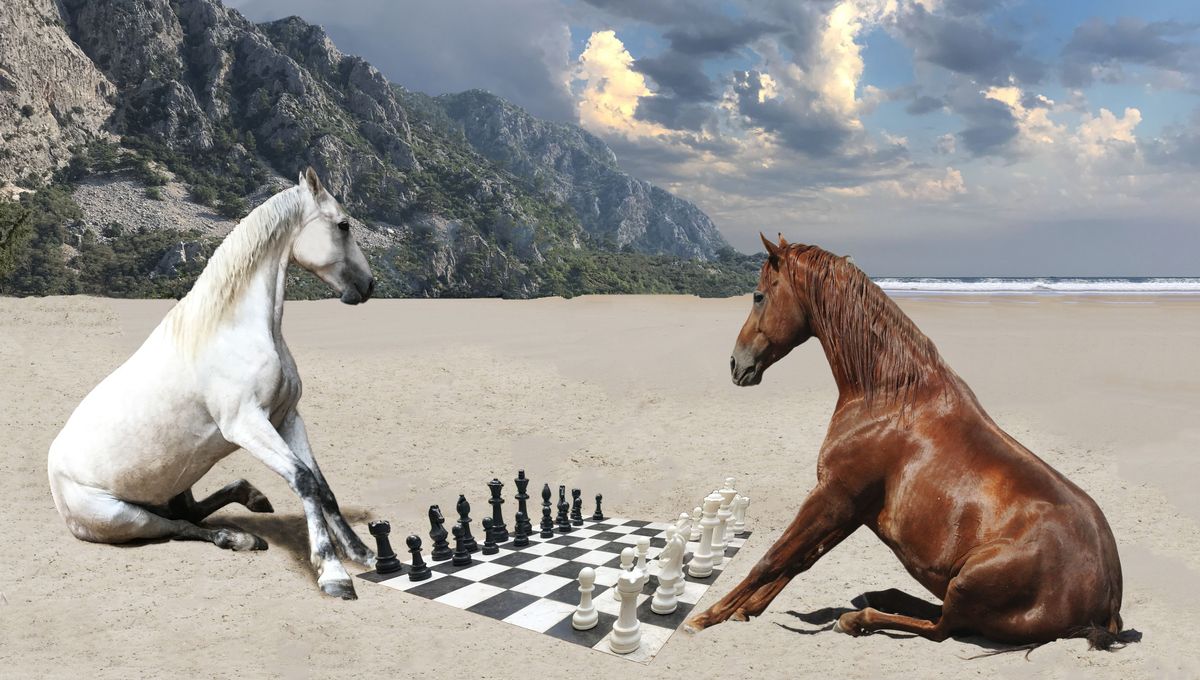
Horses might be smarter than we give them credit for, a new study has indicated. In the study, horses were rewarded for tapping a target – but their reaction when a time-out penalty was introduced for tapping at the wrong time indicates that horses might have more of an eye for strategy and cost-benefit analysis than their brains were previously thought capable of.
“At first we found that horses would just keep touching the card over and over, as they probably realized they would still get a frequent reward with minimal mental effort,” lead researcher Dr Carrie Ijichi of Nottingham Trent University, UK, said in a statement. “There was no cost for indiscriminate hitting, sometimes it paid off, sometimes it didn’t. When we introduced a cost for their errors, however, they could instantly understand and play the game properly.”
“This suggests that the horses knew all along what the rules of the game were,” added study co-author Louise Evans.
Now, those well-versed in the weird and wonderful history of horse behavior may have just been reminded of Clever Hans, the horse that was purported to be able to do mathematics (but was revealed to simply be observing the responses of those around him, responding accordingly to get a little treat). However, the study authors note that “though it is never possible to rule out a Clever Hans effect when a human is present, such unintended cues would have been present in sessions one to three, where subjects did not demonstrate that they understood the task.”
The study involved 20 horses aged between 11 and 22 years old at Nottingham Trent University Brackenhurst Equestrian Centre. They were conditioned to associate a whistle with being given a tasty handful of Ulsakind cubes, and were then tasked with tapping an A3 laminated card with their nose or muzzle, with a whistle and a treat accompanying a correct touch response.
Then, a “stop” signal was thrown into the mix, consisting of an LED cyclist’s torch strapped to the trainer’s upper abdomen. When the light was on and the horse tapped the card, a 10-second time-out period began, where the trainer stepped back, looked down, and lowered the target, removing the opportunity to earn a snack. The duration of the stop signal was randomized to ensure “it was the light itself that signalled the No-Go contingency and not predictable intervals.”
The researchers wrote that “though some individuals reduced their errors from session three to four more than others, all but one individual reduced errors in response to the introduction of the cost suggesting a remarkably prevalent ability within the group to do so.”
“We were expecting horses’ performance to improve when we introduced the time-out, but were surprised by how immediate and significant the improvement was,” Evans explained. “Animals usually need several repetitions of a task to gradually acquire new knowledge, whereas our horses immediately improved when we introduced a cost for errors.”
“Horses are not natural geniuses, they are thought of as mediocre, but this study shows they’re not average and are in fact more cognitively advanced than we give them credit for. We now think that horses may be able to use a form of learning called ‘model-based learning’ which was thought to be too complex for them. This will now help us to understand their behaviour and capabilities much better,” Ijichi said. “It’s fascinating because they have a very underdeveloped pre-frontal cortex which is what we typically credit with producing that type of thinking in humans.”
“This means they must be using another area of the brain to achieve a similar result and this teaches us that we shouldn’t make assumptions about animal intelligence or sentience based on whether they are ‘built’ just like us.”
The study is published in Applied Animal Behaviour Science.
Source Link: Horses May Be Capable Of Cost-Benefit Analysis